CATEGORIES
Kategorier

How Not To Handle An Epidemic
The lockdowns were meant to buy time to put in place appropriate health measures and contain the coronavirus’ spread, but they have failed to achieve the objective and heaped immense misery on the marginalised sections of society. India is still in the exponential phase of the COVID-19 infection and community transmission is a reality that the government refuses to accept.

Tragedy on foot
As the COVID-19-induced lockdown cuts the ground beneath their feet in Tamil Nadu, thousands of migrant workers are trudging along the highway to the relative safety of their upcountry homes.

Sarpanchs as game changers
Odisha manages to keep COVID-19 well under control because of the strong participation of panchayati raj institutions and the community at the grass-roots level under the leadership of Chief Minister Naveen Patnaik.

Scapegoating China
As the COVID-19 death rate spikes and the economy tanks in the United States, Donald Trump and his advisers target China and the World Health Organisation with an eye to winning the forthcoming presidential election.

New worries
Kerala’s measured approach to the pandemic and lockdown has yielded results. But it still has to grapple with their huge economic impact on its economy, which it feels the Centre’s special financial relief package does little to alleviate.
No love lost for labour
Taking advantage of the lockdown and the inability of workers to organise protests, many State governments introduce sweeping changes to labour laws to the detriment of workers on the pretext of reviving production and boosting the economy.

Capital's Malthusian moment
In a world that needs substantial reorienting of production and distribution, Indian capital is resorting to a militant form of moribund neoliberalism to overcome its current crisis. In this pursuit of profit, it is ready and willing to throw into mortal peril millions whom it adjudicates as not worth their means—an admixture of social Darwinism born of capital’s avarice and brutalism spawned by Hindutva. .

Understanding migration
When governments and their plans are found to be blatantly wanting in addressing reverse migration, exercises such as the Ekta Parishad’s survey of migrant workers throughout India can be useful to work out creative long-lasting solutions.

Waiting for Jabalpur moment
The Supreme Court’s role in ensuring executive accountability during the ongoing lockdown leaves much to be desired. Standing in shining contrast is the record of some High Courts.

An empty package
The Modi regime, which has been unable to control the COVID-19 infection, restore economic activity and provide relief to millions exposed to starvation, trains its sights on Indian democracy, making use of the panic generated by fear and a lockdown that forecloses paths of resistance.

How A Virus Evolves
The mutations of SARS-CoV-2, according to a new study, have led to the emergence of a dominant virus type, Type A2a, distinctly different from the original virus, Type O, that emerged from Wuhan, and spreading with much higher frequencies than the original version.
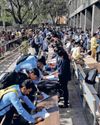
Job Offers Withdrawn, Internships Now Unpaid
Engineering and business school graduates stare at a bleak future as job offers are withdrawn or revised, while delays in joining dates add to the climate of uncertainty.

‘Disdainful neglect of public sector must end'
Interview with Professor K. Srinath Reddy, president, Public Health Foundation of India, and member of the ICMR’s high-level technical committee on COVID-19.
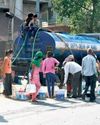
In search of a road map
It is now increasingly clear that the government did not think through and provide for the consequences of the lockdown.

The way forward on migrant issues
Even as Kerala and Odisha have taken proactive measures for migrant welfare in the wake of the lockdown, a permanent solution to migrants’ problems may lie in the implementation of the report of the first-ever task force on migration that was submitted to the Centre in 2017.

The iron hand is out
The coronavirus pandemic has come in handy for governments to tighten their hold by curbing civil liberties and cracking down on political opponents, critics and vulnerable sections of people, including migrant labour.
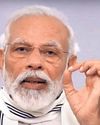
Clueless captain
As the nation longs for relief from the pandemic and the economic misery caused by an ill-planned lockdown, the government prefers symbolism over substance, exposing its lack of meaningful leadership.

RISING TREND
There are no signs of any let-up in the COVID case numbers well into the third phase of the lockdown even as issues of violation of physical distancing norms, mistreatment of front-line health workers, inadequate public health infrastructure and increasing distress among the poor come to the fore in most States, besides of course the low testing numbers and haphazard screening and isolation of suspect cases.
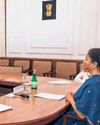
Dystopian pipe dream
The reluctance of the Narendra Modi regime to extend fiscal support to those in real need of help during a prolonged lockdown suggests that it is promoting further concentration of capital. Dire consequences await the economy and the polity.
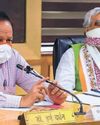
BLAME GAME
Faced with the failure of its lockdown-centric strategy, the Centre blames the States and the people for the rising graph of COVID-19 infection in the country. Grossly inadequate Union health budgets and the long-term failure to build a robust public health infrastructure have compounded the crisis.
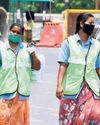
Court In Covid Times
The judiciary’s handling of cases relating to mitigation of the common man’s suffering leaves much to be desired.

Lockdown And After
In India, decisions on strategies to contain COVID-19 are being made on the basis of unreliable data, but two things are clear: the number of infections is still on the rise and once the lockdown is lifted there will be a resurgence of cases. The government needs to come up with a calibrated approach to manage both in the post-lockdown period.

In search of a strategy
There is a lack of clarity on the epidemiological basis for the extension of the lockdown and an information gap at various levels on containment procedures.
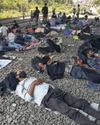
Surprise surge
In Maharashtra, Mumbai is emerging a hotspot, but the people are generally happy with the government’s efforts to contain the virus and ensure that people’s needs are met during the lockdown.
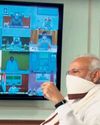
Raw deal to States
When cooperation and trust are the keywords for governments in the fight against COVID, the ruling dispensation at the Centre has, against the principles of federalism, undermined even the State governments’ spaces for negotiation.

Bumpy road
Despite posting impressive recovery from a sharp spike in COVID-19 cases, Tamil Nadu is worried about losing a battle as lack of adequate testing kits has hampered aggressive testing during the lockdown.

Rural distress
A countrywide survey of rural households during the lockdown confirms widespread distress and reaffirms the importance of public provisioning of food and other essentials, and of the urgent need for cash payments to stricken households.

Data discrepancy
A couple of studies use naturally occurring control groups—passengers in the Diamond Princess and those who returned to Wuhan after foreign travel—and COVID-19 mortality data to calculate the Infection Fatality Ratio and with that work backwards to arrive at the true caseload in a country, which is far higher than the official numbers put out by countries.
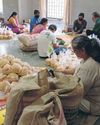
Community efforts
While non-governmental organisations step up to meet the food needs of migrant workers, the lack of adequate testing and the inordinate focus on Bengaluru remain worrisome.

Angling for a swap line
India’s central bank is in talks with the U.S. Federal Reserve for a swap line that will give it access to dollars at a time when it is experiencing large foreign capital outflows owing to the COVID-19-induced global economic crisis.